Ellen and Jim Have a Blog, Too
We are two part-time academics. Ellen teaches in the English department and Jim in the IT program at George Mason University.


Dreaming the Austen movies · 25 June 07
Dear Marianne,
One way I know I am deep into a project is I begin to dream of what I am reading over and over again—and now also watching with intense scrutiny, high alertness (aided by the pause button and stills capture mechanism of a vlnc viewer). When I was writing my dissertation on Clarissa, I would wake at night to find myself dreaming about that book. When I wrote my book on Trollope, I would wake to find myself dreaming of incidents and characters and inventing scenes for Trollope’s novels from their lines. When I’ve written long essays on memoirs, poetry, plays, I’ve done the same: real people, characters, lines, whole scenes play before me.
Well, I found that when I had begun to watch and take thorough notes (as I then thought) on the 1972 Emma I would wake at night, and find I had been dreaming of John Carson as Mr Knightley. Not as in this still (picked for how well it shows the kind of male beauty once desired for serious TV and stage plays):
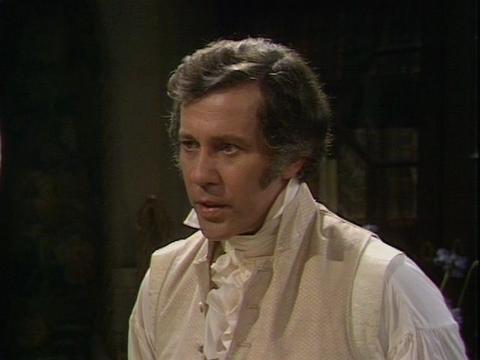
I dreamt of Carson in his dark-wine maroon red breeches suit and soft ivory white lacy shirt (which he thriftily dons several times) as he conversed at the various parties and get-togethers in Emma and danced first with Harriet and then with Emma.
It’s hard to put into words what this intermediary male type was (say 1940s to 1970s). Like Donal McCann and Philip Latham (the heroes of the 1970s Pallisers), Carson is not a matinee almost effeminate looking (in the face) suave and aristocratic (Laurence Olivier must stand for this) icon, nor yet the steely-tough-rough macho yet vulnerable supersensitive male we have become accustomed to since the 1990s (Colin Firth, Alan Rickman, most recently Rupert Penry-Jones). Carson’s equivalent can yet be found in the films, e.g., J. J. Feilds in the 2007 NA (not mentioned for his attractiveness yet chosen for Henry Tilney).
Our hint is in the situation. Mr Knightley fends off Mrs. Elton’s meanness; the older male type was noble at heart, loving too, and a gentleman in Shakespeare’s sense of the word.
Here for example is Emma unaware revealing her deep love for Mr Knightley as she hears him say how he values openness, sincerity:
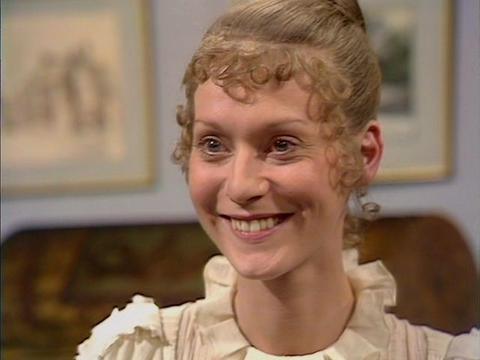
And here they are enjoying a spontaneous joke together. As I recall Emma was making fun of herself, and the ringing laughter of Mr Knightley had nothing of meanness or triumph over another in it:
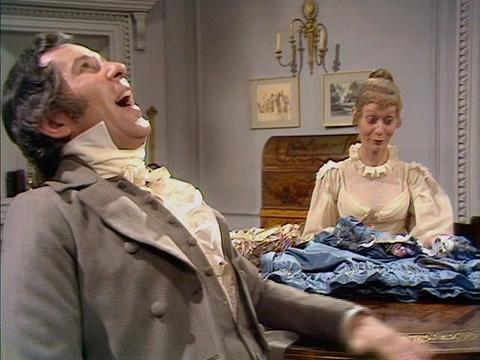
But I have lost my train of thought.
I have been waking at night finding my mind filled with images from the Austen movies. The ones I find myself dreaming (I tell myself) are those I’m intensely drawn to. Like the 1979 Pride and Prejudice last night when I woke to remember a scene where my heart had been deeply touched (between Elizabeth Garvie as Emma and Barbara Shelley as Mrs Gardiner, one which does not exist in the novel but transposes so effectively words Elizabeth, Mrs Gardener and the narrator use to slightly different purpose elsewhere). When I find the film-makers transposing material from Austen’s text in this way or closer still and making it come alive with actors and scene and sound and movement, I feel deep joy. I felt this again and again in the 1983 Mansfield Park and this 1979 Pride and Prejudice though they both make some radical departures (allowable according to the criteria for faithfulness which is that you match the pivotal events of the original story, reproduce most of the characters and famous lines, with some allowance for modernizing interpretations and necessary as well as advantageous alterations filmic media provides), somewhat less so in the 1983 MP. Also the same wild thrill for a moment in the 1971 Persuasion, and a lingering intense pleasure and slower building delight as I watched and rewatched the 1972 Emma.
I wrote earlier that I was a little dismayed to find the poetry about movies I was sent to be about action-adventure films, worship of sexed-up icons (especially of women stars by men viewers) and shallow amoral archetypes. Nothing on costume drama whatsoever. My students’ response to Longitude, 2/3s of which I’ve screened in class, suggests that intelligent screenplays and depth of feeling and thought, semi-accurate history, in short the best costume drama has to offer is a select taste. Most of the poets who write of movies regard them condescendingly at best—not all I rush to say (and I’ve put a few good movie poems on my previous blogs).
My idea of the poetry of movies is what our deepest dream life can take from it to enrich our existence at the deepest levels and make philosophical truth from. I admit that I too woke to find myself dreaming of someone of the opposite sex and know that when the actress does not correspond to some idea I have in my heart about Austen’s heroine I find myself baulked, my dream strained, but when it comes to the 1979 movie I woke to find myself dreaming of the many green landscapes with tiny figures in them that this movie specializes in (as it were). With the 2007 NA too I woke remembering the landscapes. This seems to me consistent with what the faithful type movie must give us—and those who make such films know it, be it seascape (and ships at sea, cliffs, mountains, bays, vast old cities, as in Longitude), landscape, the great and small house, or idyllic garden just after the rain.
Conceived as a drawing-room comedy, with only the iconic Box Hill scene done on location, nonetheless, the 1972 Emma has as one of its last long scenes Emma just as she is desperate for reassurance coming up her Mr Knightley in the gardens of Hartfield:
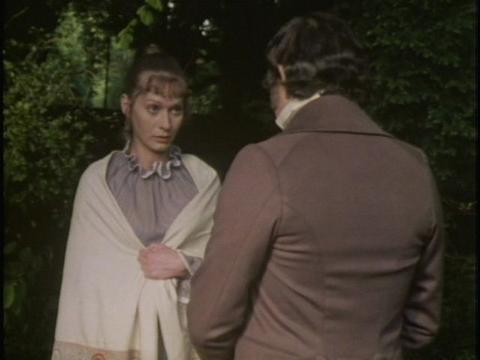
And they must walk deep into the rain-drenched landscape to a pavilion to confide their love in one another:
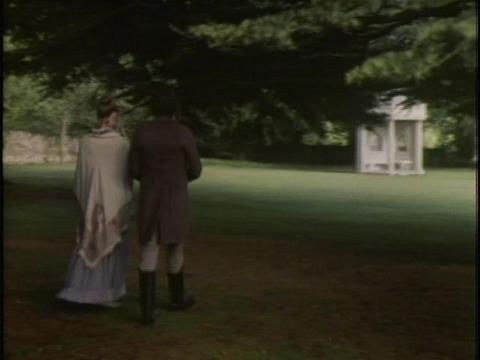
I will come back soon to do write more adequately of the 1979 P&P than I’ve done so far. Next to my computer on my desk is my an old beaten up copy of P&P (probably the fifth that has gotten into this state by now), and I read Austen herself as I go. I am with her still and she never fails me.
Elinor
--
Posted by: Ellen
* * *
Comment
- Just a very quick late-night note to say I enjoyed reading your thoughts on this production of Emma; and that I also find moments from films or TV dramas sticking in my mind and turning up in dreams.:) Sorry not to have been around online over the last few days but various things have got in the way.
— Judy Jun 25, 5:34pm # - Dear Judy,
Good to hear from you. It's about 1:20 pm here and I’m about to begin watching very slowly the fifth episode of the 1979 P&P. I’m taking such good notes I might just transcribe the screenplay and go back to the 1972 Emma and transcribe that one. Jim says I should take out the time and do that.
I’ve come on to say the telling thing to me about the 1995 P&P is the scenes I thought most closely transposed from Austen’s books were those with Benjamin Whitrow as Mr. Bennet. I offer the idea that Moray Watson and Donald Sutherland performed a conception of the character that is more believable psychologically, but that Whitrow is closer to the more mostly two-dimensional half-satiric conception in Austen's P&P. Now these are not for me dream material (says she smiling).
E.M.
— Elinor Jun 26, 1:09pm # - A poem by Barbara Guest (whose poetry we have been putting on WW and discussing just a bit:
It seems to me on dreams, on pictures in the mind, which I connect with the movies function in our consciousness (as beautiful stills), making me recall that Henry James said “the picture” was central to the novelist’s art.
Green Revolutions
by Barbara Guest
Being drunk upstairs and listening
to voices downstairs. The roll of the sea
sounding calm
after the voices
and the machinery
Tibet with Monaco
thrown in for measure
Distant greens
they appear on walls when one is tired
the dark background greens then the light ones
bringing us closer. As landscape appears
with its fresh basket approaching the car
then relinquishing, going away, telling us
something that is secret, not even whispering,
but indicating as if an ear of corn might be over there
choice and ripe, but neglected.
The cars go away. The voices
go away. For lunch. At noon.
It’s harsh with old Donne in his steeple.
I’m upstairs ‘looking at a picture’
like a Bostonian in Florence, ‘looking at a picture.’
Now it’s green. Now it isn’t.
E.M.
— Elinor Jun 27, 9:31am #
commenting closed for this article
